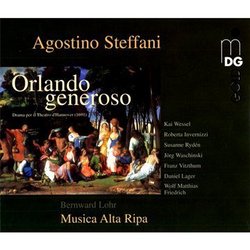| All Artists: Agostino Steffani, Bernward Lohr, Daniel Lager, Franz Vitzthum, Kai Wessel, Musica Alta Ripa, Jorg Waschinski, Roberta Invernizzi, Susanne Ryden Title: Agostino Steffani: Orlando generoso Members Wishing: 0 Total Copies: 0 Label: MD&G Records Original Release Date: 1/1/2009 Re-Release Date: 8/11/2009 Album Type: Box set Genre: Classical Style: Opera & Classical Vocal Number of Discs: 3 SwapaCD Credits: 3 UPC: 760623156620 |
Search - Agostino Steffani, Bernward Lohr, Daniel Lager :: Agostino Steffani: Orlando generoso
 | Agostino Steffani, Bernward Lohr, Daniel Lager Agostino Steffani: Orlando generoso Genre: Classical
|
Larger Image |
CD DetailsSimilar CDs
|
CD ReviewsJustice at last for neglected genius of the baroque Stephen Midgley | Tarbrax, West Calder, UK | 08/11/2009 (5 out of 5 stars) "Here is a rare treat for lovers of baroque opera and of early music in general. Agostino Steffani (1654-1728), composer, diplomat and priest, was a musician of exceptional talent and originality, revered in his time - by the young Handel among many others - but unfortunately little heard today, at least until recently. "Orlando generoso" (1691) is one of a number of operas he wrote for the prestigious Hanover court where, as is soon evident from hearing the music, he was able to call on many of the finest musicians of his time.
At first sight it would be easy to dismiss the plot as the usual baroque opera nonsense, involving pairs of lovers of varying constancy, mistaken identities, rough justice and wrongful imprisonment, not to mention miraculous last-minute conversions to the virtues of repentance, generosity and forgiveness. At an early stage the action suddenly switches from the Pyrenees to China, but with no discernible effect on the style of the music. However, the storyline, based on Ariosto's epic "Orlando furioso", offers telling psychological insights into some of the characters, especially the hero Orlando's progression through love, madness, despair and renunciation; and, what is more, these insights are powerfully expressed in Steffani's music. The score consists of many beautiful, varied, concise but characterful arias and duets, none of which ever outstays its welcome; these are interspersed with recitative, where much of the action and character development takes place and where any hint of monotony is avoided by frequent merging into arioso passages. Soon after the start of the work comes the first of many duets; and so here, before we know it, we find ourselves drawn into the exquisite world of Steffani's speciality, that of the vocal duet, in which graceful melodic lines and delicious suspensions are interwoven in a way equalled by few other composers. The performance of all this lovely music, moreover, is of a very high order. Musica Alta Ripa, under the expert direction of Bernward Lohr at the keyboard, are an extremely talented and experienced early music ensemble, and the continuo, strings and various wind instruments all deliver a stylish, spirited and effective interpretation of the music. The singing cast are also first-class - and just as well for, as suggested above, they need to be. There are especially fine roles for sopranos Roberta Invernizzi and Susanne Rydén, as well as for countertenors Kai Wessel (as Orlando) and Daniel Lager, which they all carry off beautifully. As for the bass Wolf Matthias Friedrich, in the role of the magician Atlante, he deserves a gallantry medal for the way he successfully tackles some fiendishly difficult passages. Finally, the happy ending (sorry for giving it away!) enables the cast and orchestra to bring the opera to a rousing and tuneful conclusion. The work is recorded live, so there are a few stage thumps and sound effects to be heard but no perceptible audience noise. In fact the recording is beautifully balanced and detailed, and does full justice to both voices and instruments. Altogether, this is a bold project by this adventurous German record label, and as things stand at the moment (August 2009) it is by far the most successful recording of a complete opera by this brilliant and fascinating composer. Now we can only hope for more of the same from MDG and from the other enterprising record companies that are still around. In the meantime, baroque music lovers who wish to investigate Steffani's music further could try his "Stabat Mater" or other sacred works and, for instrumental music, the opera suites or "Sonate da camera" - but above all, by hook or by crook, try to hear one of the rare available recordings of his truly exquisite "Duetti da camera". Record companies, if you ever read these reviews, please pay attention here: we need new recordings of more of Steffani's wonderful chamber duets to add to the superb examples on Pan Classics, Archiv and, especially, Glossa - the latter two now unfortunately deleted but still to be found in a few places. And music lovers, if you want to know more about Steffani's life and work, take a look at the fascinating biography by Colin Timms, "Polymath of the Baroque: Agostino Steffani and His Music". " |

 Track Listings (39) - Disc #1
Track Listings (39) - Disc #1